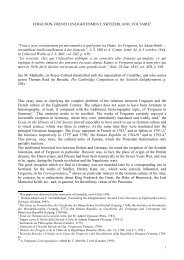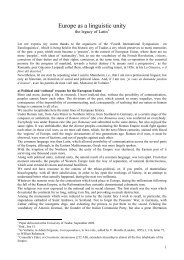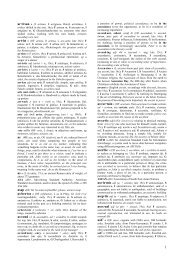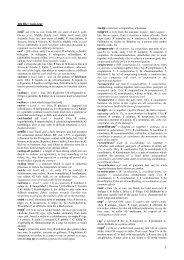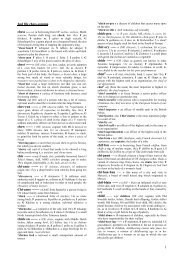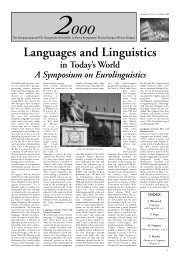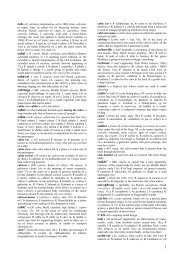Merolle imp 2-05v5 - vincenzo merolle
Merolle imp 2-05v5 - vincenzo merolle
Merolle imp 2-05v5 - vincenzo merolle
You also want an ePaper? Increase the reach of your titles
YUMPU automatically turns print PDFs into web optimized ePapers that Google loves.
Sixth Eurolinguistic Symposium<br />
A cooperation between ELAMA, Uppsala University,<br />
Humboldt Universität/Berlin and “La Sapienza” Rome<br />
The Sixth Eurolinguistic Symposium<br />
took place 16-18 September<br />
2005 at the University of<br />
Uppsala, Sweden. A cooperative<br />
undertaking by ELAMA, Uppsala<br />
University, Humboldt University,<br />
Berlin, and ‘La Sapienza’,<br />
Rome, its theme was “Migration<br />
of European languages<br />
and cultures – from the Russian<br />
rivers to the North Atlantic”.<br />
Uppsala University, Sweden’s<br />
largest and most <strong>imp</strong>ortant university,<br />
was founded in 1477.<br />
Uppsala, with its many cafés,<br />
parks and cyclists, is a picturesque<br />
town with a unique atmosphere.<br />
Sweden’s fourth<br />
largest city, it is nevertheless<br />
small enough to make it an ideal<br />
location for a conference of this<br />
kind.<br />
In an opening round-table discussion<br />
on the first evening, in<br />
which most of the participating<br />
ELAMA members took part, it<br />
was decided that Prof. Sture<br />
Ureland, hitherto acting chairman<br />
of ELAMA, would act as<br />
provisional chairman of a new<br />
Europe-wide Eurolinguistic Association<br />
(Eurolinguistica.org),<br />
for a period of two years, until<br />
the new association has constituted<br />
itself with statutes and has<br />
elected a management committee.<br />
(continued from page 6)<br />
1 Jean Viviès, English Travel<br />
Narratives in the Eighteenth Century:<br />
Exploring Genres (Aldershot:<br />
Ashgate, 2002) 25.<br />
2 Voir sur ce point Ingrid<br />
Kuczynski, “Reading a Landscape:<br />
Ann Radcliffe’s A Journey<br />
Made in the Summer of 1794,<br />
through Holland and the Western<br />
Frontier of Germany, with a Return<br />
Down the Rhine (1795),”<br />
British Romantics as Readers: Intertextualities,<br />
Maps of Misreading,<br />
Reinterpretations, eds. M.<br />
Gassenmeier, P. Bridzun, J.M.<br />
Gurr and F.E. Pointner (Heidelberg:<br />
Universitätsverlag C.<br />
Winter, 1998): 241-57.<br />
3 Claude Fierobe, «Le voyage<br />
“gothique.”» Trema 9 (1984):<br />
165.<br />
4 Frédéric Ogée, “Channelling<br />
Emotions: Travel and Literary<br />
Creation in Smollett and<br />
Sterne,” Studies on Voltaire and<br />
the Eighteenth Century 292<br />
(1991): 33.<br />
5<br />
Raymond D. Havens, “Ann<br />
Radcliffe’s Nature Descriptions,”<br />
MLN 66 (1951): 251-<br />
55.<br />
6 L’édition de référence utilisée<br />
pour tous les romans d’Ann<br />
Radcliffe sera celle publiée par<br />
OUP en World’s Classics:<br />
Ann Radcliffe, The Castles of<br />
Athlin and Dunbayne, ed. Alison<br />
Milbank (1789; Oxford:<br />
OUP, 1995) (CAD); A Sicilian<br />
Romance, ed. Alison Milbank<br />
(1790; Oxford: OUP, 1993)<br />
(SR); The Romance of the Forest,<br />
ed. Chloe Chard (1791; Oxford:<br />
OUP, 1986) (RF); The<br />
The Europe-wide scope of Eurolinguistics<br />
is the reason for<br />
this change of name from the<br />
locally restricted ELAMA (Eurolinguistischer<br />
Arbeitskreis<br />
Mannheim) to a much wider denotation.<br />
The new title is intended<br />
to provide for a multifaceted<br />
organisation comprising<br />
several European sub-sections,<br />
e.g. Eurolinguistics North,<br />
South, East, West and Centre. It<br />
is to be a roof under which these<br />
regional sections share the common<br />
aims and guidelines formulated<br />
in the Pushkin Theses.<br />
After this discussion, the main<br />
programme of lectures and presentations<br />
was started by Prof.<br />
Harald Runblom, member of<br />
the board of regents of the Baltic<br />
University Programme (BUP),<br />
who gave an account of this network<br />
of some 180 universities<br />
and institutions of higher education<br />
in the Baltic Sea Region.<br />
This cooperation was initiated<br />
in 1991 to promote environmental,<br />
economic, cultural and<br />
democratic development in 14<br />
different countries belonging to<br />
the Baltic Sea drainage area.<br />
Friday morning saw the official<br />
opening ceremony of the twoday<br />
symposium with a full<br />
schedule of plenary and section<br />
meetings. As in the earlier sym-<br />
Mysteries of Udolpho, ed.<br />
Bonamy Dobrée (1794; Oxford:<br />
OUP, 1980) (MU); The<br />
Italian, ed. Frederick Garber<br />
(1797; Oxford: OUP, 1992) (I).<br />
7 Le mot travel vient du français<br />
«travail» lui-même dérivé du bas<br />
latin trepalium, instrument de<br />
torture.<br />
8 James Boswell, Life of Johnson,<br />
ed. R.W. Chapman (London:<br />
OUP, 1965) 742.<br />
9 Voir mon article «Mrs Radcliffe<br />
et l’art du paysage transculturel<br />
européen,» 2000 The European<br />
Journal 2 (2001): 4-6.<br />
10 Maurice Lévy, préface, in<br />
Elizabeth Durot-Boucé, Le<br />
Lierre et la chauve-souris: réveils<br />
gothiques. Émergence du roman<br />
noir anglais (1764-1824) (Paris:<br />
PSN, 2004) 13-14.<br />
11 Ann Radcliffe, A Journey<br />
Made in the Summer of 1794,<br />
through Holland and the Western<br />
Frontier of Germany with a<br />
Return Down the Rhine: To<br />
Which Are Added Observations<br />
during a Tour to the Lakes of<br />
Lancashire, Westmoreland, and<br />
Cumberland (Hildesheim and<br />
New York: Georg Olms Verlag,<br />
1975).<br />
12 Malcolm Ware, Sublimity in<br />
the Novels of Ann Radcliffe: A<br />
Study of the Influence upon Her<br />
Craft of Edmund Burke’s Enquiry<br />
into the Origin of Our<br />
Ideas of the Sublime and Beautiful<br />
(Upsala: Lundequistska,<br />
1963) 62.<br />
13<br />
Tobias Smollett, Travels<br />
through France and Italy, ed.<br />
Frank Felsenstein (1766; Oxford:<br />
OUP, 1981) (TFI).<br />
14<br />
Durot-Boucé, Lierre 13.<br />
15 Charles C. Murrah, “Mrs<br />
Radcliffe’s Landscapes: The Eye<br />
and the Fancy,” The University<br />
of Windsor Review 18 (1984):<br />
15: «Mrs Radcliffe has deepened<br />
Burkean “obscurity” into<br />
the total darkness of a dream<br />
world.»<br />
16 Virginia Woolf, Introduction<br />
to Sterne, Laurence. A Sentimental<br />
Journey through France<br />
and Italy (London: OUP, 1935)<br />
viii-ix.<br />
17 Daniel Beresniak, Le Voyage<br />
initiatique (Paris: Montorgueil,<br />
1991) 19.<br />
18 Bruno Bettelheim, Psychanalyse<br />
des contes de fées (1976;<br />
Paris: Robert Laffont, 1995)<br />
178.<br />
19 Serge Soupel, «D’un archétype<br />
à l’autre: The Mysteries of<br />
Udolpho et Robinson Crusoe.»<br />
BSEAA XVII-XVIII 43 (1996):<br />
53.<br />
20 Mikhaïl Bakhtine, Esthétique<br />
et théorie du roman (Paris: Gallimard,<br />
1978) 389.<br />
21 Pierre Arnaud, «Emily ou de<br />
l’éducation: The Mysteries of<br />
Udolpho, Bildungsroman<br />
féminin,» BSEAA XVII-XVIII<br />
43 (1996): 50.<br />
22 Michel Butor, «Le voyage et<br />
l’écriture,» Répertoire 4 (Paris:<br />
Minuit, 1974): 9-10.<br />
23 Henry Fielding, Joseph Andrews,<br />
ed. Martin C. Battestin<br />
(Oxford: Clarendon, 1967)<br />
182.<br />
24 Laurence Sterne, A Sentimental<br />
Journey through France and<br />
Italy by Mr. Yorick, ed. Gardner<br />
D Stout, Jr. (Berkeley: University<br />
of California Press, 1967)<br />
83.<br />
posia, the participants came<br />
from countries all over Europe<br />
and were to speak about topics<br />
relating to various European regions.<br />
They were welcomed by<br />
Prof. Sture Ureland, initiator<br />
and main organiser of the symposium.<br />
He was followed by<br />
Prof. Svante Strandberg, Director<br />
of the Institute<br />
of Nordic Place<br />
Names and Dr.<br />
Eva Brylla, Institute<br />
of Dialectology<br />
and Folklore,<br />
the symposium’s<br />
joint Swedish<br />
hosts in Uppsala.<br />
They outlined the<br />
historical background<br />
and present-day<br />
activities<br />
of their institutes<br />
which are located<br />
in the Uppsala<br />
Arkivcentrum, the<br />
university building<br />
where the symposium<br />
took place.<br />
After these inaugurating<br />
addresses,<br />
the participants<br />
went for an early lunch to the<br />
café of the University Library,<br />
Carolina Rediviva. There they<br />
could view the famous Gothic<br />
fourth-century bible, Codex Argenteus<br />
(“The Silver Bible”), the<br />
history of which was given during<br />
lunch by Rune Palm (Univ.<br />
of Stockholm).<br />
Lunch was followed by two<br />
more plenary lectures: Bob<br />
Quinn from Ireland explained<br />
his thesis of the “Dynamic moat<br />
round Europe” and Rune Palm<br />
UPPSALA, THE CATHEDRAL<br />
spoke about “Language contact<br />
in the Viking Age”. After this,<br />
the participants had to choose<br />
between Eurolinguistics West<br />
and Eurolinguistics Centre. So,<br />
while Martina Müller (Univ. of<br />
Mannheim) gave her description<br />
of “The Celtic, regional<br />
and minority languages abroad<br />
project” - one of seven Europewide<br />
projects funded by the European<br />
Commission to promote<br />
language learning and linguistic<br />
diversity - Ludger Kremer<br />
(Antwerp) focused on<br />
“Neuzeitliche Migration und<br />
niederländisch-(nieder)deutscher<br />
Sprachkontakt im Nord- und<br />
Ostseegebiet”. Vincenzo<br />
<strong>Merolle</strong> (ELAMA’s correspondent<br />
at ‘La Sapienza’, Rome)<br />
spoke about “The difficulties of,<br />
and reasons for, compiling a European<br />
dictionary”.<br />
Other lectures, in a mixed order<br />
of Eurolinguistics West, Centre,<br />
North and South, included<br />
“The influence of Norse on the<br />
Orkney Island dialect” (Thomas<br />
Rendall, Orkney), “Evidence of<br />
Yiddish documented in European<br />
societies”, (Ulrike<br />
Kiefer/Robert Neumann, Lampertheim)<br />
and John Stewart’s account<br />
on “The state of research<br />
on Swedish/Scandinavian languages<br />
and peoples in North<br />
America”, which was more a paper<br />
on Global Eurolinguistics.<br />
Then, two papers by Italian participants<br />
were presented:<br />
Alessandra Serra “Hot Spots:<br />
Encoding English in Italian advertising”<br />
and finally Cristiana<br />
Pugliese (Univ. of Molise) “Language<br />
Minorities in the Molise<br />
region, Italy.”<br />
Plenary lectures continued on<br />
Saturday morning with Jurij<br />
Kusmenko (Humboldt Univ.,<br />
Berlin) on “The Scandinavian<br />
languages between the Finno-<br />
Ugric Northeast and West Germanic<br />
Southwest”. This was followed<br />
by Prof. Eva Czáto (Univ.<br />
of Uppsala) on “Migrations of<br />
Turkic-speaking groups into Europe”.<br />
After a short break, Peter<br />
Wagener, from Deutsches<br />
Spracharchiv, IdS, Mannheim,<br />
gave an illustrated introduction<br />
to Gesprochenes Deutsch, a collection<br />
of spoken material from E.<br />
Zwirner´s corpus and other corpora<br />
which is now available to a<br />
large extent on the Internet. The<br />
plenary lectures of the day ended<br />
with Giuseppe Castorina<br />
(Univ. of Rome ‘La Sapienza’,<br />
head of Eurolinguistica South),<br />
who gave a paper on “Interpreting<br />
convergence and diversity<br />
questions” in collaboration with<br />
Manuela Cipri (Rome) who<br />
dealt with “Simboli di unità e di<br />
europeità”.<br />
In the afternoon, the lecturers<br />
were Michael Riessler (Univ. of<br />
Leipzig) talking on “Contact-induced<br />
language change and the<br />
structure of noun phrases in<br />
Germanic languages” and Eric<br />
De Geer (Univ. of Uppsala) who<br />
presented a paper on Eurolinguistics<br />
North: “Where do<br />
Finnish speakers in Sweden live<br />
– a geographical and statistical<br />
problem”. The only speaker on<br />
behalf of Eurolinguistics East<br />
this time was Olga Voronkova,<br />
Univ. of Heidelberg, who spoke<br />
about language death in Baltic<br />
languages. Eurolinguistics<br />
South-East provided Magdalena<br />
Cvetkovic (Univ. of Mannheim)<br />
on the migration of Serbs in the<br />
past and the present, and Ivanka<br />
Steber (Univ. of Mannheim) on<br />
her fieldwork in Romania:<br />
“Zugewanderte Sprachminderheiten<br />
im rumänischen Banat”.<br />
Lelija Soc˘anac (Linguistic Institute,<br />
Zagreb) concluded this section<br />
with some interesting details<br />
of her project about “Migration<br />
of the Croats to Burgenland,<br />
Austria – an ethnolinguistic<br />
study”.<br />
The largest section of this year’s<br />
symposium was contributed by<br />
Eurolinguistics South. Most of<br />
the speakers from this group<br />
spoke on Saturday afternoon:<br />
Francesca Rosati (Univ. of Teramo),<br />
“English in Europe”;<br />
Francesca Vaccarelli (Rome “La<br />
Sapienza”), “English in Italy”,<br />
7



